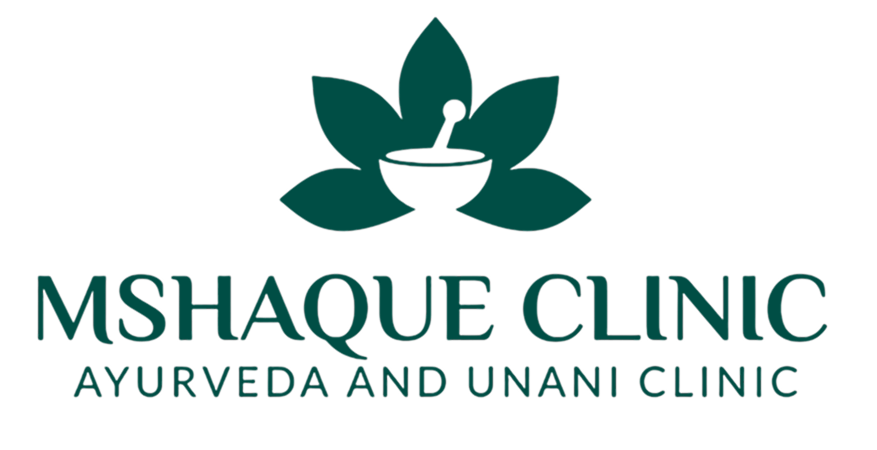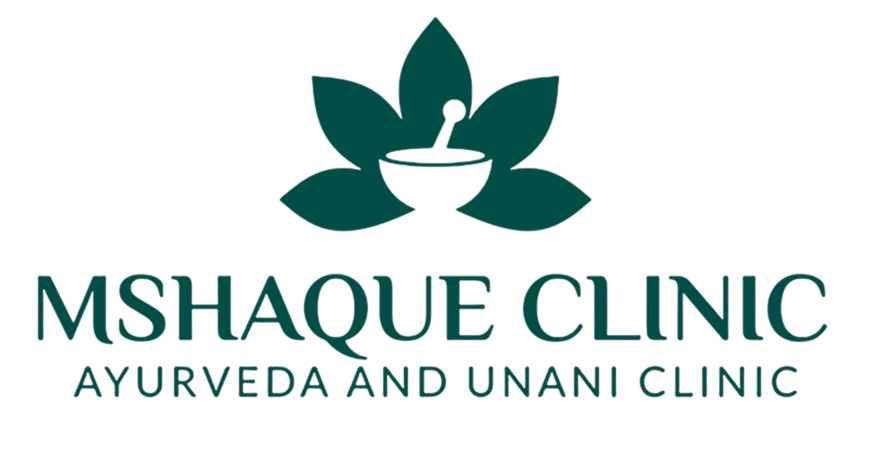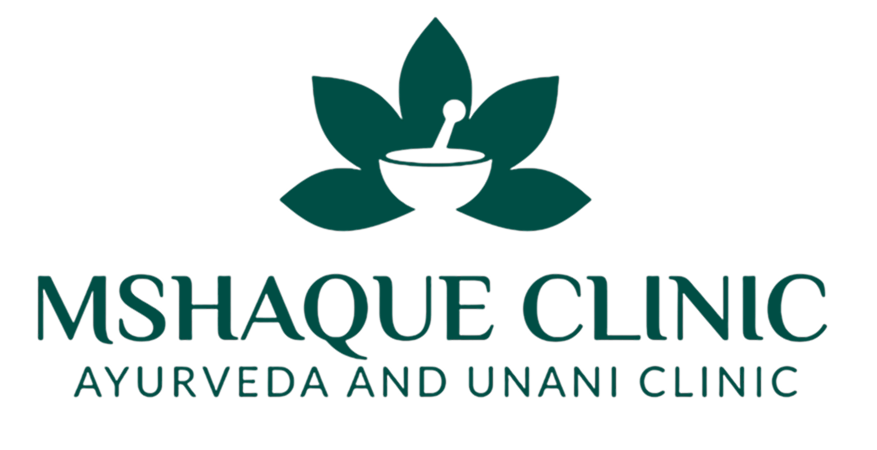Ayurvedic Herbs For Inflammation: You will be better off looking for natural remedies to maintain your health. Ideally, inflammation causes a lot of issues and medical conditions. If you can manage inflammation effectively, a lot of health issues will be eliminated.
In this regard, looking for natural remedies is recommended, which is promoted by the use of ayurvedic herbs for inflammation. This ancient medicine system of India can cure minor inflammations as well as those chronic ones that cause serious health issues such as digestive disorders, arthritis, and different heart diseases.
At Mshaque Clinic, you will receive comprehensive and personalized Ayurvedic treatments under the expert guidance of Dr. M. S. Haque and Dr. A. Perwaiz. Our natural solutions will reduce inflammation from the root for long-term relief.
Ayurvedic Herbs For Inflammation: The Common Ayurvedic Herbs for Inflammation
The most common ayurvedic herbs for inflammation include turmeric, triphala, ashwagandha, and neem. However, there is much more that you will learn as you continue reading this article.
These specific ayurvedic herbs are believed to have anti-inflammatory properties that will help promote immunity and joint health. These are not synthetic drugs and, therefore, are natural remedies that ensure a holistic cure of the condition from the root.
All you have to do is integrate these herbs into your daily lifestyle or diet and reap the benefits of their effectiveness and useful properties to reduce inflammation.
Ayurvedic Herbs For Inflammation: Ayurvedic Herbs List
In addition to the common ones, here is a short Ayurvedic herbs list for you to refer to (in alphabetical order):
- Ashwagandha
- Brahmi
- Cinnamon
- Fenugreek
- Ginger
- Guduchi
- Guggul
- Manjistha
- Mulethi
- Neem
- Shatavari
- Shallaki
- Triphala
- Tulsi
- Turmeric
Ayurvedic Herbs For Inflammation: Best Anti-Inflammatory Ayurvedic Medicine
One of the most common and best anti-inflammatory ayurvedic medicine is turmeric. Found in abundance, it comes with curcumin that helps in reducing stress due to oxidation and combat inflammation. Triphala is another common element that will reduce inflammation due to its detoxifying ability.
You may also use ashwagandha as a natural remedy to reduce inflammation typically caused by stress. It will help in reducing cortisol levels and promote good health. Neem and amla are also very useful in reducing inflammation. While neem helps in purifying your blood and reducing inflammation on the dermal level, amla will do it at the cellular level due to its higher Vitamin C content.
In addition, shallaki is also good at gaining relief from joint pain to promote mobility, just as giloy strengthens your immunity levels and helps combat inflammation.
Ayurvedic Herbs For Inflammation: Best Ayurvedic Herbs for Daily Use
At Mshaque Clinic, we integrate the best Ayurvedic herbs for daily use into our routine. This ensures quick and long-term relief.
For example, tulsi is very good at fortifying your immune system and helping in reducing infection. Similarly, triphala helps promote digestive functions and boost metabolism. It also helps detoxify your body. Ginger is also good for promoting digestion.
In addition, you must also have ashwagandha and raw turmeric at home. While ashwagandha is best for reducing stress and enhancing energy levels, raw turmeric will help boost antioxidant and anti-inflammatory properties.
You can also use Brahmi and fenugreek daily because the former will ensure mental clarity and boost cognitive function. The latter will improve digestion and help maintain the right level of blood sugar.
Ayurvedic Herbs For Inflammation: Best Ayurvedic Medicine for Overall Health
People who want to maintain overall well-being typically find the following as the best ayurvedic medicine for overall health:
- Chyawanprash – This is quite a delicious herbal jam rich in vitamin C and antioxidants.
- Triphala powder – This will help detoxify and maintain gut health.
- Amla juice – This juice will boost immunity and also help in maintaining glowing skin.
- Neem tablets – These tablets help purify blood, which, in turn, results in healthier skin.
- Brahmi oil – This particular oil has been proven to enhance the functionality of the brain and reduce stress and anxiety.
- Ashwagandha capsules – These will help manage stress and improve strength and immunity.
- Shilajit – It will raise the energy level and also help slow down the aging process.
At Mshaque Clinic, patients can choose the right combination of these herbs according to their unique needs and health conditions.
Our Other Articles:
Ayurvedic Herbs For Anti-Aging- All You Need To Know
Ayurvedic Herbs For Better Sleep- All You Need To Know
Ayurvedic Medicine For Improving Metabolism- All You Need To Know
Ayurvedic Medicine For Improving Endometrial Lining- All You Need To Know
Types Of Eczema- All You Need To Know
Ayurvedic Herbs For Inflammation: Ayurvedic Medicine List with Disease
If you are suffering from specific health conditions and do not know which Ayurvedic herb will be suitable for you, here is an Ayurvedic medicine list with disease to help you out.
People suffering from joint pain and arthritis typically find turmeric, ashwagandha, and Boswellia to be extremely helpful.
Similarly, if you are suffering from diabetes, you must use neem fenugreek or guduchi daily.
Issues with digestive systems can be restored with regular consumption of ginger, Triphala, and mulethi.
If you want healthier skin with no disorder, try using neem, turmeric, and manjistha.
Brahmi, ashwagandha, and tulsi are good for mental clarity, stress reduction, and anxiety relief.
Detoxification of the liver is promoted by Triphala, kutki, and bhumyamalaki.
The health of your heart will improve significantly by using garlic, arjuna, and guggul regularly.
Ayurvedic Herbs For Inflammation: Identifying Ayurvedic Herbs
Though most Ayurvedic herbs are easily recognizable, a few may not. If you are not carrying an Ayurvedic herbs list with pictures, here are the names of a few common ones that will help you make the right selection.
- Turmeric – Bright yellow-coloured root.
- Ashwagandha – Tiny red berries.
- Neem – Bright green leaves with jagged edges.
- Tulsi – Small green leaves with a distinct smell.
- Triphala – A group of three dried fruits.
- Brahmi – Small, green, almost circular leaves.
- Fenugreek – Bitter yellow seeds.
Conclusion
Inflammation, if ignored, may cause serious health issues. We at Mshaque Clinic provide personalized care based on Ayurvedic concepts to manage inflammation effectively using the natural anti-inflammatory properties of Ayurvedic herbs.
You can combat inflammation naturally with expert tips and advice from Dr. M. S. Haque and Dr. A. Perwaiz.
Use Ayurveda to control inflammation taking help from Dr. M. S. Haque and Dr. A. Perwaiz at Mshaque Clinic. Book an appointment today.
FAQs
What is the best Ayurvedic treatment for inflammation?
It is difficult to pinpoint any single Ayurvedic treatment that is the best for inflammation management. However, some good ones are turmeric, triphala, shallaki, and giloy. Ayurvedic massage using Mahanarayan or other medicative oil also helps in reducing inflammation as it helps relieve stiffness in muscles. Also, for long-term benefits, make changes in your lifestyle and switch to a healthy diet.
What is the most powerful herb for inflammation?
Though ashwagandha, shallaki, neem, and giloy are good for reducing inflammation and inflammatory responses, research has found that turmeric is most powerful in this aspect due to its high curcumin concentration.
Which is the king of herbs in Ayurveda?
Ashwagandha is typically considered the king of Ayurveda, with tulsi playing the queen’s role due to their inherent properties and benefits. Ashwagandha primarily offers a wide range of benefits, including but not limited to reducing stress, promoting longevity, and boosting immunity.
What is the anti-inflammatory diet in Ayurveda?
Well, cold, fried, spicy, and processed foods are strictly a no-no in an anti-inflammatory diet. You must always include fresh foods that can be digested easily. The list of food and ingredients must include ginger, turmeric, cloves, cinnamon, sesame oil, coconut oil, and ghee. To ensure cool and balanced pitta, include cool foods like cucumber, coconut water, and more.
Content Checked and Verified By

Dr. A. Perwaiz
B.U.M.S (KOL) IMRP (OXFORD, UK) FIID (UNSW) AUSTRALIA)




